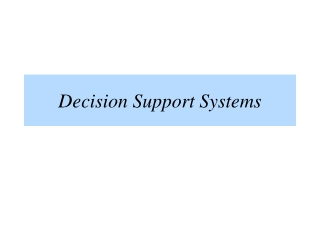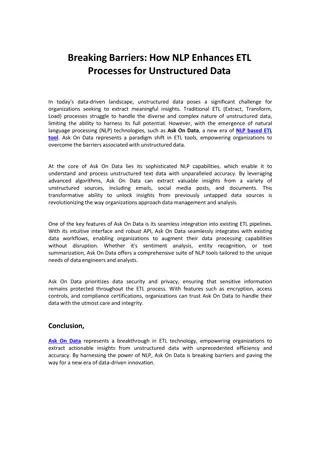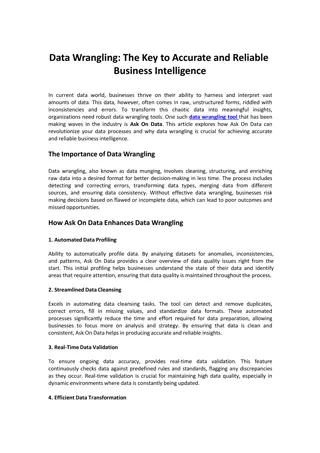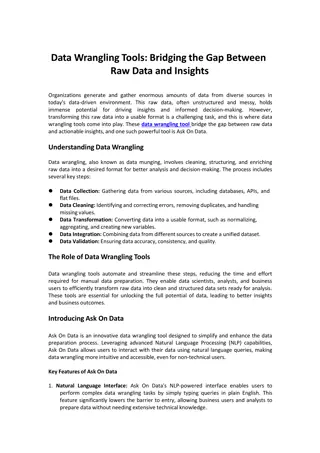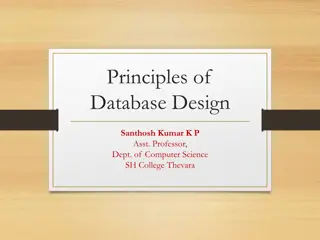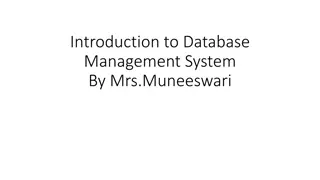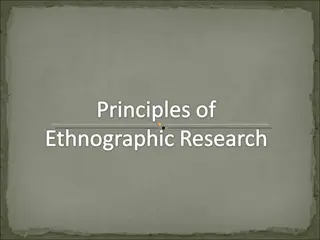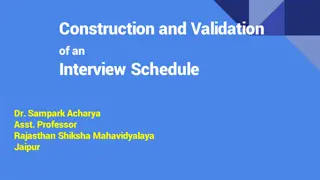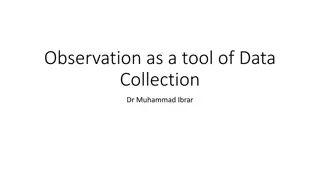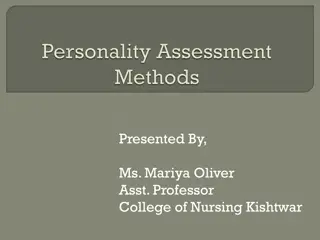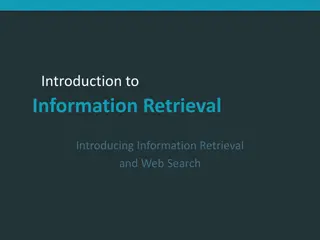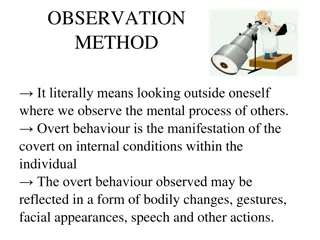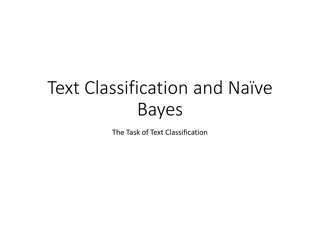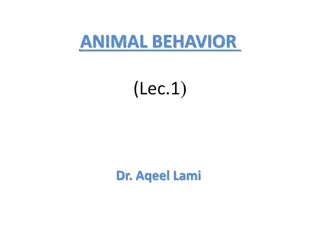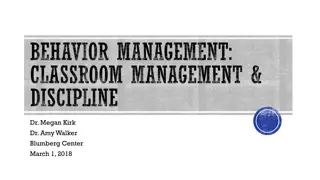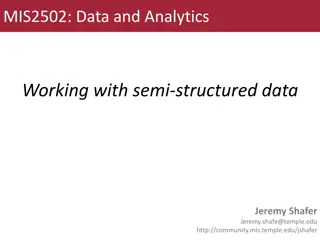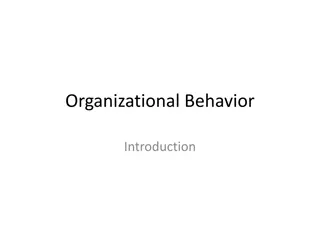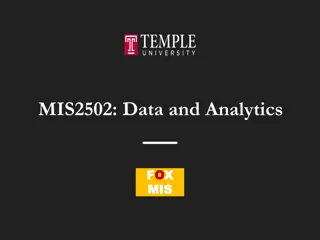Decision Support Systems
Decision Support Systems (DSS) offer potential to assist in solving both semi-structured and unstructured problems. They provide capabilities to handle large amounts of data, perform complex analysis, and support different decision-making approaches.
1 views • 30 slides
Function Based Thinking
Function-based thinking in Missouri Schoolwide Positive Behavior Support, emphasizing data-based decision-making, mission clarity, and effective teaching practices. Understand how behavior is related to the environment and how environmental interventions play a key role in shaping expected behaviors
6 views • 27 slides
How NLP Enhances ETL Processes for Unstructured Data know with Ask On Data
In today's data-driven landscape, unstructured data poses a significant challenge for organizations seeking to extract meaningful insights. Traditional ETL (Extract, Transform, Load) processes struggle to handle the diverse and complex nature of unstructured data, limiting the ability to harness its
2 views • 1 slides
How NLP Enhances ETL Processes for Unstructured Data know with Ask On Data
In today's data-driven landscape, unstructured data poses a significant challenge for organizations seeking to extract meaningful insights. Traditional ETL (Extract, Transform, Load) processes struggle to handle the diverse and complex nature of unstructured data, limiting the ability to harness its
1 views • 1 slides
Addressing Predatory Behavior in the Fellowship
Predatory behavior, especially towards vulnerable members, is a concerning issue in the fellowship. This behavior includes unwelcome advances, exploitation of power dynamics, and institutional sexism. The discussion on predatory behavior necessitates honest dialogue and a united approach for a safer
3 views • 13 slides
Partnership between Low and Low-medium income countries to boost health. systems
This presentation highlights the common challenges faced by low and low-medium income countries in boosting their health systems, such as political instability, lack of funding, and unstructured healthcare systems. It emphasizes the importance of collaborative efforts between these countries to addr
6 views • 6 slides
Building Intelligent NLP based Data Pipelines
Building intelligent with NLP based data pipeline tool with Ask On Data is essential for organizations seeking to unlock the full potential of unstructured data. By harnessing the power of NLP, organizations can enhance productivity, gain valuable insights, and achieve greater success in today's dat
8 views • 2 slides
Data Wrangling like Ask On Data Provides Accurate and Reliable Business Intelligence
In current data world, businesses thrive on their ability to harness and interpret vast amounts of data. This data, however, often comes in raw, unstructured forms, riddled with inconsistencies and errors. To transform this chaotic data into meaningful insights, organizations need robust data wrangl
0 views • 2 slides
Bridging the Gap Between Raw Data and Insights with Data Wrangling Tool
Organizations generate and gather enormous amounts of data from diverse sources in today's data-driven environment. This raw data, often unstructured and messy, holds immense potential for driving insights and informed decision-making. However, transforming this raw data into a usable format is a ch
0 views • 2 slides
Knowledge Graph and Corpus Driven Segmentation for Entity-Seeking Queries
This study discusses the challenges in processing entity-seeking queries, the importance of corpus in complementing knowledge graphs, and the methodology of segmentation for accurate answer inference. The research aims to bridge the gap between structured knowledge graphs and unstructured queries li
0 views • 24 slides
Database Design Principles and Management Overview
This document presents an overview of database design principles, including structured, semi-structured, and unstructured data types. It delves into the role of Database Management Systems (DBMS) in defining, constructing, manipulating, and sharing databases effectively. It also covers various types
0 views • 47 slides
Introduction to Database Management System Explained
This presentation covers the basics of database management systems, including definitions of data, types of data, structured and unstructured data, storing data in computers using file systems and database systems, and issues with file systems like data redundancy, inconsistency, difficult data acce
1 views • 18 slides
Understanding Ethnography: Art and Science of Cultural Description
Ethnography is the method of describing a group or culture through up-close experience and participation. This social science research technique focuses on contextual, unobtrusive, and collaborative characteristics that involve interpretative analyses and organic interactions. Data collection is uns
1 views • 14 slides
Understanding Consumer Behavior in Marketing
The design of a marketing program starts with understanding consumer behavior. Consumers, as the end users, play a crucial role in shaping market trends. Producers seek insights into consumer personas, market behaviors, and influencing factors. Management focuses on the consequences of consumer beha
2 views • 26 slides
Understanding Psychology: The Science of Behavior and Mental Processes
Psychology is the scientific study of behavior and mental processes. Psychologists study both observable behavior and private mental processes. The primary goals of psychology are to describe, understand, predict, and control behavior. Different branches of psychology, such as applied psychology, cl
2 views • 29 slides
Understanding Interviews: Construction, Types, and Methodologies
Interviews are essential for collecting data in exploratory research. This content elaborates on the construction, types, and methodologies of interviews, including unstructured and structured approaches. Tips for minimizing bias, training interviewers, and the benefits of face-to-face interviews ar
0 views • 50 slides
Understanding Observation as a Data Collection Tool in Behavioral Science
Observation method serves as a crucial tool for data collection in behavioral science, enabling researchers to systematically record and analyze observable phenomena. This method involves recording behavior patterns without direct interaction, providing in-depth insights into natural settings and in
0 views • 12 slides
Understanding Personality Assessments in Interviews
Personality assessments in interviews are valuable tools for evaluating a candidate's characteristics, abilities, and aspirations. Various types of assessments, such as structured and unstructured interviews, personality inventories like the Minnesota Multiphasic Personality Inventory, the Big Five
2 views • 28 slides
Introduction to Information Retrieval and Web Search
Information Retrieval (IR) involves finding unstructured material, typically text documents, within large collections stored on computers to satisfy information needs. This process extends beyond web search to include email search, corporate knowledge bases, and legal information retrieval. The text
0 views • 53 slides
Understanding Observation Methods in Psychology
Observation method in psychology involves looking outside oneself to observe the mental processes of others. It includes types such as participant and non-participant observation, structured and unstructured observation. Steps in the process include planning, execution, interpretation, and reporting
2 views • 10 slides
Understanding Inmate Behavior Management in Correctional Settings
Inmate Behavior Management in correctional facilities involves supervising inmates, implementing corrective discipline, and fostering a fair and consistent environment. It emphasizes the importance of behavior management plans, identifying undesirable traits in supervision, and passing educational a
0 views • 19 slides
Understanding Human Behavior: Foundations and Factors
Human behavior is a multifaceted subject influenced by genetic makeup, culture, and individual values. It encompasses both overt actions and covert thoughts, a product of the individual and environmental factors. Psychologists study behavior from visible (overt) actions like playing football to inne
0 views • 20 slides
Understanding Normal and Abnormal Behavior: Perspectives and Definitions
Normal behavior varies from person to person and society, influenced by individual preferences and societal norms. Abnormal behavior is characterized by an inability to function effectively or personal discomfort. The concept of normality and abnormality in psychology raises complex questions about
2 views • 8 slides
Text Classification and Nave Bayes: The Power of Categorizing Documents
Text classification, also known as text categorization, involves assigning predefined categories to free-text documents. It plays a crucial role in organizing and extracting insights from vast amounts of unstructured data present in enterprise environments. With the exponential growth of unstructure
0 views • 28 slides
Understanding Human Behavior: Insights for Social Workers
This material delves into the intricacies of human behavior, exploring factors influencing behavior such as heredity, environment, intelligence, needs, and motives. It covers the concept of human behavior, stages in life from conception to old age, and theories of human development by eminent psycho
2 views • 71 slides
Understanding Animal Behavior and Ecology
Animal behavior encompasses a range of activities such as feeding, breeding, and social interactions. Ethology focuses on studying behavior in natural environments, while behavioral ecology examines ecological aspects like predator-prey interactions. Sociobiology delves into the evolution of social
3 views • 5 slides
Understanding Behavior Management in Classroom Settings
Explore the essential topics of behavior management, classroom strategies, and discipline in educational settings. Delve into the functions of behavior, impact of trauma on learning, and effective management techniques. Learn how to identify underlying reasons for student behaviors, discuss behavior
0 views • 76 slides
Understanding Unstructured Interviews
Unstructured interviews are a form of non-directive interviews where questions are not prearranged. This method allows for flexibility and in-depth responses from participants, but it also comes with practical, ethical, and theoretical strengths and weaknesses. While unstructured interviews offer a
1 views • 6 slides
Targeting Emotions to Facilitate Behavior Change in Older Adults
Efforts in changing health behavior have traditionally focused on social and cognitive factors, but recent evidence highlights the importance of affective states in decision-making and behavior change. Janey Peterson discusses the role of emotions in achieving and sustaining behavior change to benef
0 views • 11 slides
Grading Criteria for Effort and Behavior in Educational Reporting
Effort and behavior in educational settings are evaluated based on criteria ranging from Excellent to Causing Concern. Pupils demonstrating excellent behavior show respect, responsibility, and positive engagement in learning. Those with good behavior exhibit cooperation and respect for others, albei
0 views • 9 slides
Understanding Collective Behavior in Social Work
Collective behavior encompasses spontaneous and unstructured group reactions to common influences in ambiguous situations. It includes phenomena like mobs, crowds, panics, social movements, and revolutions. Such behavior is characterized by its episodic, emotional, and unpredictable nature, often la
0 views • 14 slides
Understanding Semi-Structured Data in Data Analytics
Exploring the world of semi-structured data, we delve into its significance in data analysis. From relational databases to CSV files and Excel spreadsheets, learn about the various forms of data storage and organization. Discover the role of quotation marks, differences between structured, semi-stru
0 views • 19 slides
Understanding Applied Behavior Analysis (ABA) for Youth Interventions
Applied Behavior Analysis (ABA) is a science focusing on improving human behavior by increasing desired behaviors, teaching new skills, and generalizing behaviors. ABA emphasizes observable behaviors, measurement of behavior change, and the use of interventions in various settings like classrooms an
0 views • 25 slides
PBIS Expectations and Behavior Flowchart
The PBIS flowchart outlines behavior expectations and interventions for minor and major incidents in a school setting. It covers disrespectful behavior, disruption, defiance, property damage, theft, possession of weapons, and more. The flowchart guides teachers and staff on managing and addressing s
0 views • 6 slides
Managing Acting-Out Behavior: A Staff Development Program Review
This review discusses a staff development program created by Geoffrey Colvin, Ph.D., from the University of Oregon, focusing on preventing and managing acting-out behavior in students with emotional disturbance or behavior disorders. The program includes video presentations, strategies for behavior
0 views • 22 slides
Introduction to Information Retrieval and Web Search
Information Retrieval (IR) involves finding unstructured material, usually text documents, to satisfy information needs from large collections. This process is essential for various applications like web search, email search, and corporate knowledge bases. The evolution of unstructured vs. structure
0 views • 15 slides
Understanding Organizational Behavior and Individual Behavior
Organizational Behavior (OB) is a multidisciplinary field that combines knowledge from various disciplines to study and manage organizations effectively. It emphasizes the application of this knowledge to enhance organizational effectiveness and the well-being of participants. OB is a useful concept
0 views • 38 slides
Function-Based Behavior Support Plans: A Comprehensive Guide
Explore the process of developing Function-Based Behavior Support Plans (BSP) using Functional Behavioral Assessment (FBA). Understand the concepts of function and functional behavior assessment, learn how FBA/BSP fits within a multi-tiered support system, and practice developing BSP for students. D
0 views • 74 slides
All You Need to Know About Interview Procedures
Interviewing candidates is a crucial process in selecting the right employees, reducing turnover, and enhancing profitability. Different types of interviews such as selection, appraisal, and exit interviews serve specific purposes. The interviews can be structured or unstructured, and questions can
0 views • 20 slides
Understanding Data Structures and Formats in Analytics
Explore the various types of data structures, including structured, semi-structured, and unstructured data. Learn the role of relational databases and how data is stored differently. Delve into the significance of semi-structured and unstructured data in modern organizations.
0 views • 20 slides
